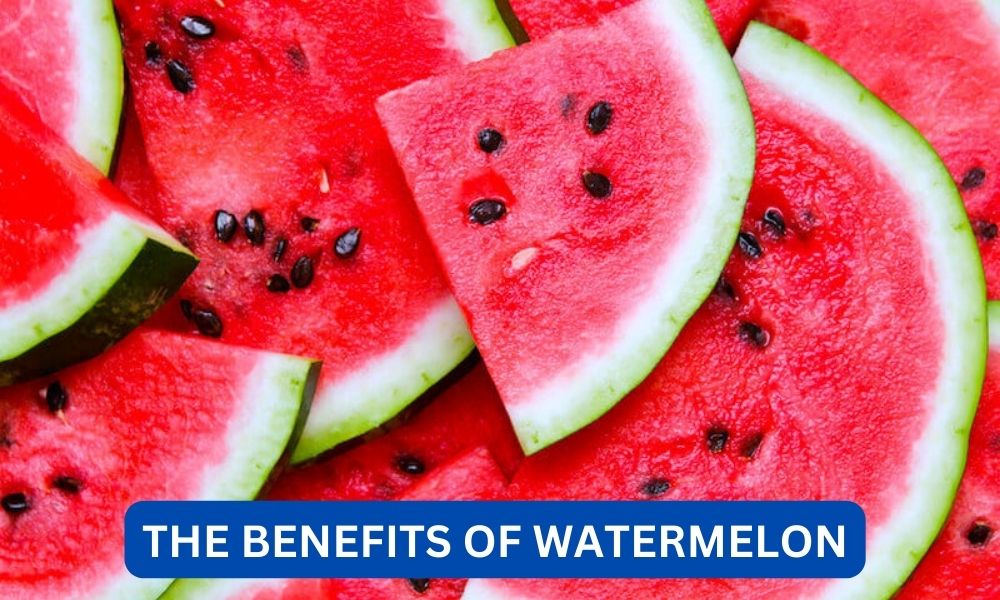Watermelon is a delicious and refreshing fruit that is enjoyed by people all over the world. It is a staple in the summer months, often seen at picnics, barbecues, and pool parties. But aside from its sweet and juicy taste, watermelon also offers a wide range of health benefits. In this article, we will delve into the various benefits of watermelon and why you should consider adding it to your diet.
Contents
Nutritional Value of Watermelon
Watermelon is not only delicious but also packed with essential nutrients. According to the United States Department of Agriculture (USDA), one cup of diced watermelon (152 grams) contains:
- 46 calories
- 0 grams of fat
- 11 grams of carbohydrates
- 9 grams of sugar
- 1 gram of fiber
- 1 gram of protein
- 21% of the recommended daily intake (RDI) of vitamin C
- 18% of the RDI of vitamin A
- 5% of the RDI of potassium
- 4% of the RDI of magnesium
- 3% of the RDI of vitamin B6
Watermelon also contains small amounts of other vitamins and minerals, including calcium, iron, and zinc. It is also a good source of antioxidants, such as lycopene and beta-carotene.
Read:what are the benefits of zincHealth Benefits of Watermelon
Now that we know the nutritional value of watermelon, let’s explore the various health benefits it offers.
1. Hydration
As mentioned earlier, watermelon is made up of about 92% water, making it an excellent fruit for hydration. Staying hydrated is crucial for our overall health, as it helps regulate body temperature, transport nutrients and oxygen to cells, and flush out waste products. Eating watermelon is a tasty and refreshing way to stay hydrated, especially during hot summer months.
2. Good for Heart Health
Watermelon contains an amino acid called citrulline, which is converted into arginine in the body. Arginine is essential for maintaining healthy blood flow and blood pressure. Studies have shown that consuming watermelon can help lower blood pressure and reduce the risk of heart disease. Additionally, the lycopene in watermelon has been linked to a reduced risk of heart disease and stroke.
3. Boosts Immune System
Watermelon is an excellent source of vitamin C, which is essential for a healthy immune system. Vitamin C helps stimulate the production of white blood cells, which are responsible for fighting off infections and diseases. A cup of watermelon provides about 21% of the RDI of vitamin C, making it a great addition to your diet to keep your immune system strong.
Read:What are benefits of fish oil?4. Anti-inflammatory Properties
Chronic inflammation is linked to various health issues, such as heart disease, cancer, and diabetes. Watermelon contains compounds that have anti-inflammatory properties, such as lycopene and cucurbitacin E. These compounds have been shown to reduce inflammation and oxidative stress in the body.
5. Good for Eye Health
Watermelon is a rich source of beta-carotene, which is converted into vitamin A in the body. Vitamin A is essential for maintaining healthy eyesight and preventing age-related macular degeneration. It also helps protect the eyes from damage caused by free radicals.
6. Aids in Weight Loss
Watermelon is a low-calorie and low-fat fruit, making it an excellent choice for those trying to lose weight. It is also high in water and fiber, which can help you feel full and satisfied, reducing the chances of overeating. Additionally, the high water content in watermelon can help keep you hydrated and prevent water retention, which can make you feel bloated.
7. Improves Digestion
Watermelon is a good source of fiber, which is essential for maintaining a healthy digestive system. Fiber helps regulate bowel movements and prevents constipation. It also feeds the good bacteria in our gut, promoting a healthy balance of gut flora.
Read:What are the benefits of fish oil supplements?8. Good for Skin and Hair
The high water content in watermelon helps keep the skin hydrated and moisturized, giving it a healthy and glowing appearance. The vitamin C in watermelon also plays a role in collagen production, which is essential for maintaining skin elasticity and preventing wrinkles. Additionally, the vitamin A in watermelon helps keep the hair and scalp healthy.
How to Incorporate Watermelon into Your Diet
Now that we know the various benefits of watermelon, you may be wondering how to incorporate it into your diet. Here are a few ideas:
- Eat it as a snack: Cut up some watermelon into bite-sized pieces and enjoy it as a refreshing snack.
- Add it to salads: Watermelon can add a sweet and juicy element to your salads. Try adding it to a spinach or feta salad.
- Make a smoothie: Blend watermelon with some yogurt and other fruits for a delicious and nutritious smoothie.
- Grill it: Grilled watermelon is a unique and tasty addition to any barbecue. Simply brush it with some olive oil and grill for a few minutes on each side.
- Make a salsa: Watermelon salsa is a delicious and refreshing topping for grilled fish or chicken.
Precautions and Side Effects
While watermelon offers many health benefits, there are a few precautions to keep in mind:
- Watermelon is high in sugar, so those with diabetes should consume it in moderation.
- Some people may be allergic to watermelon, so it is essential to watch out for any adverse reactions.
- Watermelon may interact with certain medications, so it is best to consult with a doctor if you are taking any medication.
Conclusion:
Watermelon is not only a delicious and refreshing fruit but also offers a wide range of health benefits. From hydration and heart health to weight loss and skin health, this fruit is a powerhouse of nutrients. So, the next time you see a watermelon at the grocery store, be sure to pick one up and enjoy all the benefits it has to offer.








